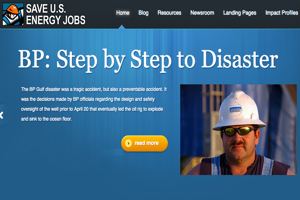Energy Industry Launches Online PR Campaign To Distance Itself From BP
 The last time anyone checked, BP’s approval rating was not in a good place (technically, somewhere between OJ Simpson‘s and Saddam Hussein‘s). The BP name is so thoroughly disgraced that, at this point, it seems to taint everything it touches, and fearing a similar fate to the one that awaits the company, the American Energy Alliance is launching an all-out campaign to distance themselves from BP.
The last time anyone checked, BP’s approval rating was not in a good place (technically, somewhere between OJ Simpson‘s and Saddam Hussein‘s). The BP name is so thoroughly disgraced that, at this point, it seems to taint everything it touches, and fearing a similar fate to the one that awaits the company, the American Energy Alliance is launching an all-out campaign to distance themselves from BP.
The AEA is a not-for-profit group affiliated with the energy industry that, according to the description on it’s “About” page, “believes that freely-functioning energy markets provide the most efficient and effective solutions to today’s global energy and environmental challenges and, as such, are critical to the well-being of individuals and society.” And it wants you to know that no other company in the American energy industry operates quite like BP.
The AEA has launched a project called “Save US Energy Jobs,” complete the social media basics– Twitter and Facebook— interviews with experts who explain where BP deviated from the norm, and a handy Flash info-graphic explaining the failures of Deepwater Horizon in exhaustive detail, pipe to pipe.
The project’s blog enhances the vilification of BP with regular posts like a “truth vs. spin” feature on BP’s proposals, as well as more defensive posts in favor of domestic drilling. The inaugural post, “BP is a Victim of Its Own Carelessness” argues that putting the entire industry in peril because of BP’s follies is unwise:
“We also need to make sure that we do not overreact. The accident, while unfortunate, should not provide an excuse for those who want to cut off access to our domestic energy resources. Why should those in the Middle East benefit from BP’s mistake? The accident should also not provide an excuse to drive significant, widespread, and ill-considered changes to our energy policies. The focus of our efforts should be on mitigating the damage caused by the spill, not using it as a political prop to advertise for poorly-constructed energy policies which will increase the price of energy and other goods and cost American jobs.”
Given the magnitude of BP’s failure with Deepwater Horizon, it’s no wonder why the rest of the field is worried that the government might start cracking down on their activities. The Three Mile Island accident in 1979 all but ended America’s short-lived infatuation with nuclear energy despite causing neither significant damage nor long-term environmental effects (though The China Syndrome and, seven years later, Chernobyl didn’t help, either). If a relatively benign error could cause that much damage to another sector of the energy industry, it’s a miracle that with the kind of disaster BP has created anyone drilling for oil today even has a job at this point. Sensing the danger, oil companies (and the non-profits who love them) are amputating BP from their network in the hopes that the diseased company won’t take the rest of them with it. While the writing is probably on the wall for off-shore oil drilling in the long run, a well-presented and appealingly-named (“Save US Energy Jobs”) argument isolating BP is the oil industry’s best bet to move on and away from the disaster in the Gulf.
New: The Mediaite One-Sheet "Newsletter of Newsletters"
Your daily summary and analysis of what the many, many media newsletters are saying and reporting. Subscribe now!






Comments
↓ Scroll down for comments ↓